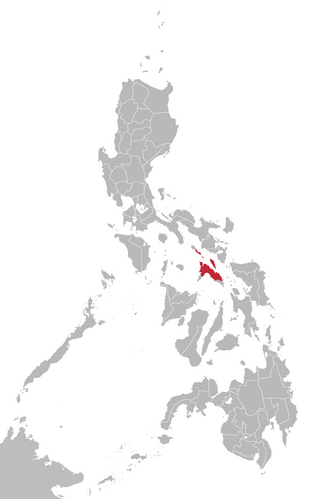Masbateño language
| Masbateño | |
|---|---|
| Minasbate | |
| Native to | Philippines |
| Region | Masbate province (entire Ticao island; almost whole portion of Masbate and Burias islands) |
| Ethnicity | Masbateño people |
Native speakers | 350,000 (2002)[1] |
| Language codes | |
| ISO 639-3 | msb |
| Glottolog | masb1238 |
 Areas where Masbateño is spoken | |
Masbateño or Minasbate is a Bicol-Visayan language spoken by more than 600,000 people, primarily in the province of Masbate in the Philippines. It is very close to Capiznon, Hiligaynon/Ilonggo and Waray-Waray, all three spoken in Visayas. It is considered a Bisakol language, meaning a language intermediate between Visayan languages and Bicolano languages.
Sounds
Masbateño has sixteen consonants: p, t, k, b, d, g, m, n, ng, s, h, w, l, r and y. There are three vowels: i, a, and u/o. The vowels u and o are allophones, with u always being used when it is the beginning and sometimes end of a syllable, and o always used when it ends a syllable. This is one of the Philippine languages which is excluded from [ɾ]-[d] allophone.
Examples
W-H Questions
- What? - Nanu?
- Who? - Sin-o?
- Where? - Diin?
- When? - San-o?
- Why? - Kay? Nanu kay?
- How? - Pan-o? Papan-o?
- Who are you? - Sin-o Ka?
- What is your name? - Nano/Ano an pangaran mo?
- When is your Birthday - San-o ka nabuhay?
- Where do you live? - Dein ka naga-estar? Taga dein ka?
Animals
- Cat - Miya/Misay
- Dog - Ido / Ayam (Ticao Island)
- Cow - Baka
- Carabao - Karabaw
- Tinday- may refer to any young animals like horse, cow, goat, carabao
- Pig - Orig (piglet) Anay (mother pig) Butakal/Takal (Male brooding pig)
- Rat - Iraga
- Ant - Sirum (Masbate Ticao Island)
- Ant- Subay (Masbate Main Land)
- Ant- Amimitas (Masbate Main Land)
- Ant - Hornigas (Masbate Main Land)
- Ant - Hamorigas ( Palanas,Masbate Main Land )
- Chicken - Umagak (hen); Siyo/piso (chic)
- Lizard - Tiki
- Gecko - Tuko
- Snake - Sawa
- Bird - Sapat (Masbate); Pispis (Mandaon)
Common Phrases
- I hate you! - Urit ako sa imo! / Habo ko sa imo!
- I love you. - Namomo-ot ako sa imo. Namumot-an ta ikaw. (Bicolano-influenced)
- I love you. - Palangga ta ikaw. (Masbate Mainland)
- Let's talk. - Mag-istoryahan kita.
- Can I join? - Pwede ako kaintra?
- Pleased to meet you. - Malipay ako na nagbagat kita.
- How you doin'? - Matiano ka dida?
- Please let me know. - Ipaaram la sa akon.
- Please help me. - Buligi man ako.
- Can you teach me? -Pwede mo ba ako matukduan? Pwede magpatukdo?
- I want to learn Masbatenyo. - Gusto ko makaaram mag-istorya san Masbatenyo.
- Good morning! - Maayo na aga!
- Good afternoon! - Maayo na hapon!
- Good evening! - Maayo na gab-i!
- Good night! - Turog maayo.
- Let's eat. - Karaon na kita.
- You're (really) beautiful. - Kaganda mo (gayud).
- Please call me. - Tawagi tabi ako.
- Can I ask you a favor? - Pwede mangayo pabor (o bulig)?
- IMPATCHO- IMPLATCHO
Counting
- One - Isad/Usad
- Two - Duwa/Duha
- Three - Tulo
- Four - Upat
- Five - Lima
- Six - Unom
- Seven - Pito
- Eight - Walo
- Nine - Siyam
- Ten - Napulo
- Eleven - Onse
- Twenty - Baynte
- Twenty-one - Baynte uno
- One hundred - Usad kagatos
- One hundred thirty-five (135) - Syento traynta i singko
- One thousand - Usad karibo
Common Adjectives
- Beautiful - Maganda
- Ugly - Maraot / Pangit
- Hot - Mainit / Maalingahot
- Cold - Mayamig / Matugnaw
- Good - Maayo / Matahom
- Bad - Maraot / Malain
- Great - Matibay
- Sick - Maysakit / May ginabatyag
- Fast - Matulin / Madasig
- Slow - Mahinay / Maluya
- High - Hataas / Hitaas
- Low - Hamubo
- Deep - Hadarom
- Wide - Halapad
- Loose - Mahaluga
- Narrow - Masiot
- Long - Halaba
- Short - Halip-ot
- Light - Lasaw (color) / Magaan (weight)
- Heavy - Mabug-at
- Dark - Makutom / Madulom / Maitom
Literature in Masbatenyo
Sani na Dalan[2]
By Sherwin Balbuena
Kun mag-ági ka
Saní na dálan
Warâ na'n balíkan
Saní na dálan
May púnò san mángga
Na punô sin búnga
An úna nag-agi
An puno ginyugyog
Takdag pati putot
Panduha nag-agi
Kay wara na'n bunga
Dahon an ginpa-pa
Pantulo nag-agi
Kay wara na'n dahon
Panit an ginkaon
Pang-upat nag-agi
Kay wara na'n panit
Gamot an ginkitkit
An ulhi nag-agi
Kay wara na'n gamot
Nagsupa sin lapok
An Punò
Ako usad na punò
Sa tungâ san kadlagan
Mga sapát na pino
Ako man an istáran
Maw-ot ko’n maghitaas
Makit-an an Sirangan
Pero habo maglampas
Na an iba duluman
Kahirayo san langit
Mas apiki an dampog
Kun abuton kasakit
Lalo pa kun mahulog
Maw-ot ko man mamunga
San matam-is na hinog
Na matilawan san dila
Kag magtubo an pisog
Ugaling kun matumba
Sa kakusog san hangin
Kaupod ko, batuna
Sa Luyo masaringsing
Ugaling kun magluyos
Sa handong san iba
Kaupod ko, pagbalos
Mamudo sa inda
References
- ^ Masbateño at Ethnologue (18th ed., 2015) (subscription required)
- ^ http://www.poetrysoup.com/poems_poets/poem_detail.aspx?ID=505372
